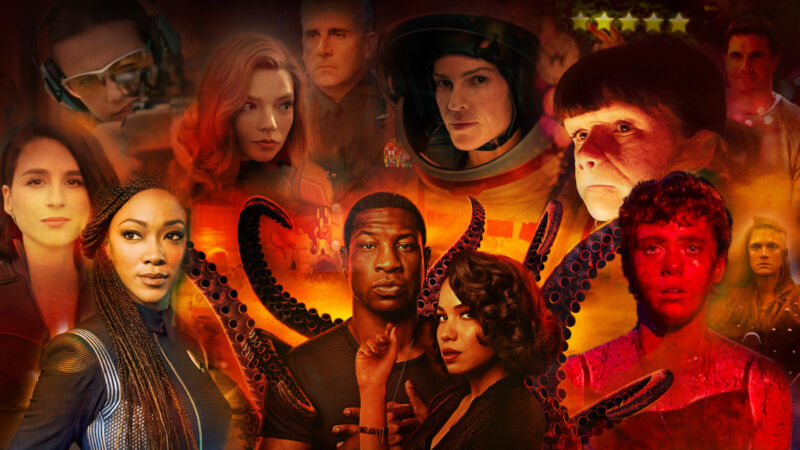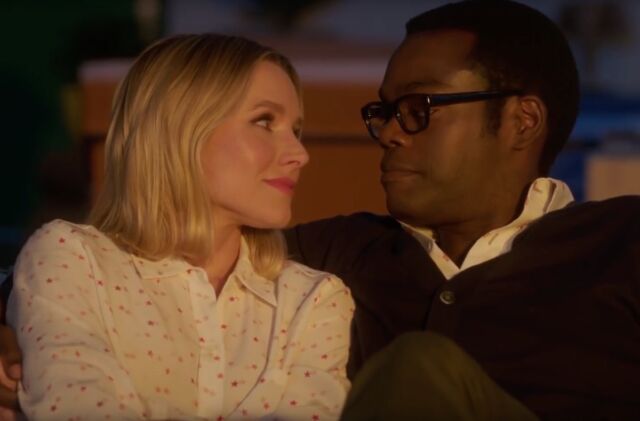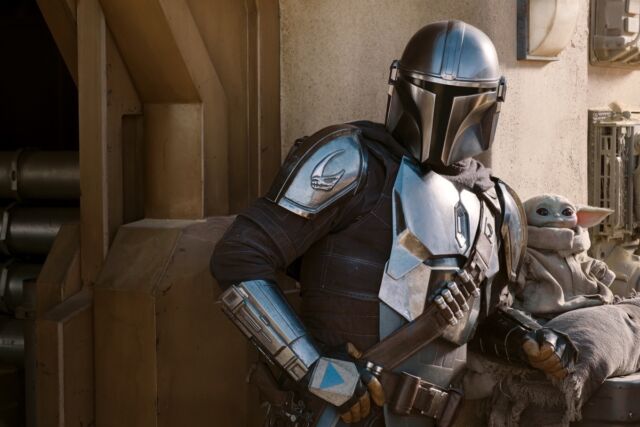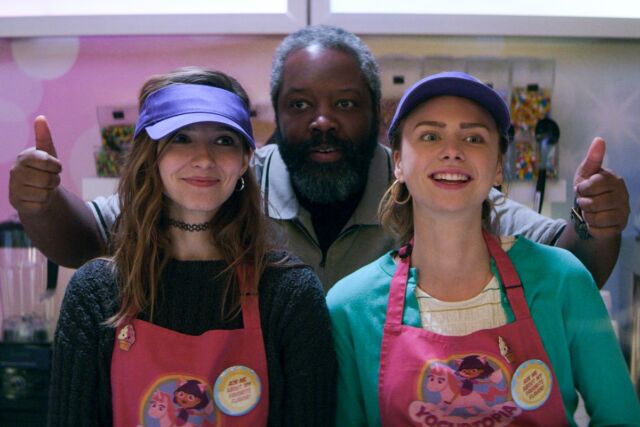
This was the year that going to the movies suddenly became a rare event. As we observed in our roundup of the best films in 2020, “The pandemic has ransacked reliable sources of new films, like theaters and film festivals. And any number of major titles we may have looked forward to on January 1, 2020 (from Dune to Top Gun) have instead chosen to push back by at least 12 months.” Fortunately, TV was there to pick up the slack and keep pandemic-weary viewers entertained at home with more quality content than ever before—much of it from streaming platforms rather than traditional broadcast television.
It’s a trend that has been building for some time, but the streaming wars are now in full swing. Just two broadcast offerings made our year-end list, although CBS’ streaming platform, CBS All Access, made its mark with two of its Star Trek franchise programs. Netflix dominates with nine entries, followed by HBO/HBO Max (5), Amazon (3), and Disney+/ESPN+ (2), with Hulu/FX getting a category all its own. Heck, even YouTube gets a nod this year with Philadelphia Sixers Matisse Thybulle’s series of videos documenting life in the NBA bubble.
We don’t know what 2021 holds for television, with rising production costs squeezing budgets and forcing premature cancellations of many of our favorite shows this year that were on the bubble in terms of viewership (R.I.P. Teenage Bounty Hunters). The ongoing pandemic means new productions-in-progress could be shut down any moment if someone on set tests positive for COVID-19 until quarantine periods are complete. So we may have fewer offerings as the industry reckons with the fallout from the pandemic.
But we’ll still have the glorious cornucopia that was this past year in television. With apologies to the many great series we just didn’t have room for on this year’s list, here are our favorite TV watches and binges for 2020, in no particular order:

The Good Place series finale
We kicked off 2020 by bidding a tearful farewell to The Good Place, NBC’s hilariously inventive, yet thoughtful, take on the afterlife. The show delivered rich characters and plenty of laughs, but it also challenged us to ponder deeper questions of what it really means to be a good person. Consistently intelligent and insightful, particularly about human foibles, each season held enough surprising turns and unexpected twists to keep a typical sitcom running for twice as many seasons. But The Good Place was never a typical sitcom. In the series finale, the writers didn’t blink while grappling with (among other things) the troubling implications of an infinite afterlife for finite humans.
In the show’s final episodes, the Soul Squad revamped the afterlife so that all humans will have the chance to be rebooted as many times as necessary, until they show enough improvement to earn admission to the Good Place. As a reward, the Soul Squad finally gets to the Good Place. And that’s when we learn that an eternity of perfection is not all it’s cracked up to be.
The Good Place residents are frankly bored with eternity. There are only so many times you can fulfill all your deepest desires before it just becomes run-of-the-mill. The solution: there is one last door that anyone in the Good Place can walk through when they feel they are ready to end their afterlife. Maybe. What happens beyond the door remains an unknowable mystery, much like that faced by humans on Earth pondering what happens after you die. It’s the fact that life ends and that we don’t know what comes next that gives our lives purpose and meaning. It’s why our actions, relationships, and so forth matter so much.
Honestly, the series could have ended right there. But did you really think series creator Michael Schur was going to let us off that easy? The roughly 80-minute finale was essentially a prolonged bittersweet denouement, in which we see each original member of the Soul Squad reach a point where they want to move on in some way—whether they choose to walk through the final door or not. Schur could have spun out the show for many more seasons, but in the end he applied the same principle to the series as Michael did to fix the Good Place. Knowing that its time was finite made this final season—and the entire run—especially bittersweet, and hence that much more meaningful, to its fans.
—Jennifer Ouellette, Senior Writer

The Mandalorian S2
What does it mean to wear a mask? What can a person hide behind a mask, one they’re devoted to wearing because of a lifelong order? And at what point does the humanity behind a mask reveal itself anyway, even in spite of the strength and thickness of beskar?
The Mandalorian‘s second season was many things. For starters, it was more of a traditional Gunsmoke-style TV series than last time around, owing to fetch quests and monsters-of-the-week moving the action along. It also settled into a comfortable groove at times in terms of ensuring that certain first-season plot points and characters might appear again. There was simply no way Mando S2 was going to deliver as many surprises or develop as many new characters.
Some of those S1 returns were more fruitful than others—with the high highs absolutely making up for the ho-hum retreads, proving that Jon Favreau and Dave Filoni can maintain an entire corner of the Star Wars universe quite handily. But last year’s series-premiere bombshell of an adorable, miniaturized Yoda eventually had to give way to other obvious series cameos and references, and this season was all about those payoffs—all done quite masterfully.
Take the season’s fifth episode, where Mando seeks wise counsel on what exactly to do with “The Child.” There’s a spoilery mess I can’t get into that links this episode to another Star Wars property, but bigger than that was how a new kinda-sorta ally and Mando each join forces for just long enough to fulfill their own destinies. In Mando’s case, this was resolved in part by an impeccably shot face-off in a wide-open town, battered with dust and poverty in the kind of way that you could practically see a tumbleweed blow past as Pedro Pascal and his rival exchanged not-at-all-pleasantries. The Mandalorian S2 savors these tense moments, these silent passages where cameras can linger, and enough action, character development, and light-hearted ribbing build to these moments in the exact ways that define the best scenes in modern television.
Above all else, of course, is the mask. A mask can mean many things, and The Mandalorian S2 speaks to that very human concept, mixed with satisfying amounts of Star Wars action, bombast, lore, and heart to make it some of the best television of the past 10 years.
—Sam Machkovech, Tech Culture Editor

Teenage Bounty Hunters
Twin sisters in Atlanta, Georgia, juggle the demands of high school, their Christian youth group, and raging hormones with a side gig working for a local bounty hunter in Teenage Bounty Hunters. Creator Kathleen Jordan’s delightful comedy-drama definitely brings the laughs with its razor-sharp satire, but it is also a smart, nuanced coming of age story with some genuinely surprising twists and turns. The dialogue is note-perfect, the characters are complicated in interesting ways, and these ten episodes are expertly paced, making Teenage Bounty Hunters a perfect weekend binge.
Atlanta high schoolers Sterling (Maddie Phillips) and Blair (Anjelica Bette Fellini) meet bounty hunter Bowser (Kadeem Hardison) by accident one night when they crash their father’s pricey hunting truck into the car of a bail jumper (“skip”) he’s chasing. And like the good southern Christian girls they are, they have guns and are more than proficient with said weapons, capturing Bowser’s skip for him in exchange for a share of the reward. They wheedle their way into working more jobs, telling their straitlaced parents that they are working at Yogurtopia, a frozen yogurt shop that Bowser runs when not tracking down skips. (Every bounty hunter needs a side hustle.)
Phillips and Fellini are terrific as the twin sisters, bringing just the right mix of bravado, innocence, curiosity, and vulnerability to their roles. They are charming and likable characters when they could have easily just been annoying. Hardison’s world-weary Bowser can’t help but feel protective toward them through his exasperation. The satirization of evangelical Christian purity culture is spot-on, and Wynn Everett is sheer perfection as Ellen Johnson, the relentlessly cheery fellowship teacher at Willingham Academy.
Alas, Netflix opted not to renew Teenage Bounty Hunters for a second season—another casualty of the higher production costs associated with taking the necessary pandemic precautions on sets. So we’ll never get to see how that final twist regarding the twins’ parentage plays out.
—Jennifer Ouellette
https://arstechnica.com/?p=1726397

